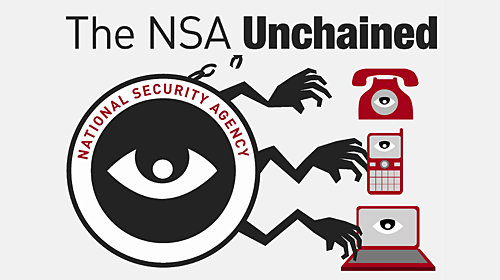Congressional Representatives Support ACLU Push for Transparency in Secret Surveillance Court


Sixteen members of Congress have come out in support of the ACLU's motion to make public the legal opinions the government relies on to engage in the mass surveillance of Americans' phone calls. Five days after The Guardian revealed that the National Security Agency is tracking the phone calls of literally millions of innocent Americans, we asked the secret Foreign Intelligence Surveillance Court (FISC)—which authorized the surveillance—to publish the opinions that enable the program, in order to allow a meaningful public debate. Late last Friday, the group of U.S. representatives joined our call, by filing a friend-of-the-court brief explaining the importance of greater transparency.
Those representatives are part of a growing chorus of congressional backlash against the recent revelations regarding the NSA's sweeping surveillance of Americans' communications. Here is what Representative Justin Amash (R-Mich.), one of those 16 representatives, said in support of our motion:
We accept that free countries must engage in secret operations from time to time to protect their citizens. Free countries must not, however, operate under secret laws. Secret court opinions obscure the law. They prevent public debate on critical policy issues and they stop Congress from fulfilling its duty to enact sound laws and fix broken ones.
Excessive secrecy is unwise and un-American. It corrodes our democratic institutions, masks abuse, and enables extreme policy. As the renowned Judge Damon Keith once said, "Democracies die behind closed doors."
As the representatives explain in their brief, secret law impedes not just public debate about the law, but the legislative process itself:
Recent disclosures concerning the government's surveillance programs have raised profound questions about Americans' security and liberty. Section 215 of the Patriot Act, which authorizes at least one of the programs, is set to expire on June 1, 2015. Whether and to what extent Congress will reauthorize Section 215 depends directly on Congress's—and its constituents'—knowledge about how Section 215 currently operates. Reading the law itself is not enough. The statutory text does not provide adequate clarity—to the public or to many in government—on the breadth of authority that intelligence and law-enforcement agencies evidently claim under those statutes, or how those claims of authority are consistent with other laws and constitutional restraints. Without full access to this Court's opinions interpreting and construing the law, Congress and the public cannot have a meaningful reauthorization debate, frustrating Congress's constitutional responsibility to make rules for the Executive Branch of government.
Representative Amash has proposed a bill—co-sponsored by all 15 of the other representatives supporting the ACLU's FISC motion—called the LIBERT-E Act, which would limit the government's ability to engage in dragnet monitoring of our phone calls.
The representatives' brief is well worth reading. Here is a full list of those who signed it:
Rep. Justin Amash
Rep. Thomas Massie
Rep. Paul Broun
Rep. Tom McClintock
Rep. Tulsi Gabbard
Rep. Eleanor Holmes Norton
Rep. Morgan Griffith
Rep. Beto O'Rourke
Rep. Rush Holt
Rep. Steve Pearce
Rep. Walter Jones
Rep. Matt Salmon
Rep. Barbara Lee
Rep. Mark Sanford
Rep. Zoe Lofgren
Rep. Ted Yoho
Learn more about government surveillance and other civil liberty issues: Sign up for breaking news alerts, follow us on Twitter, and like us on Facebook.


